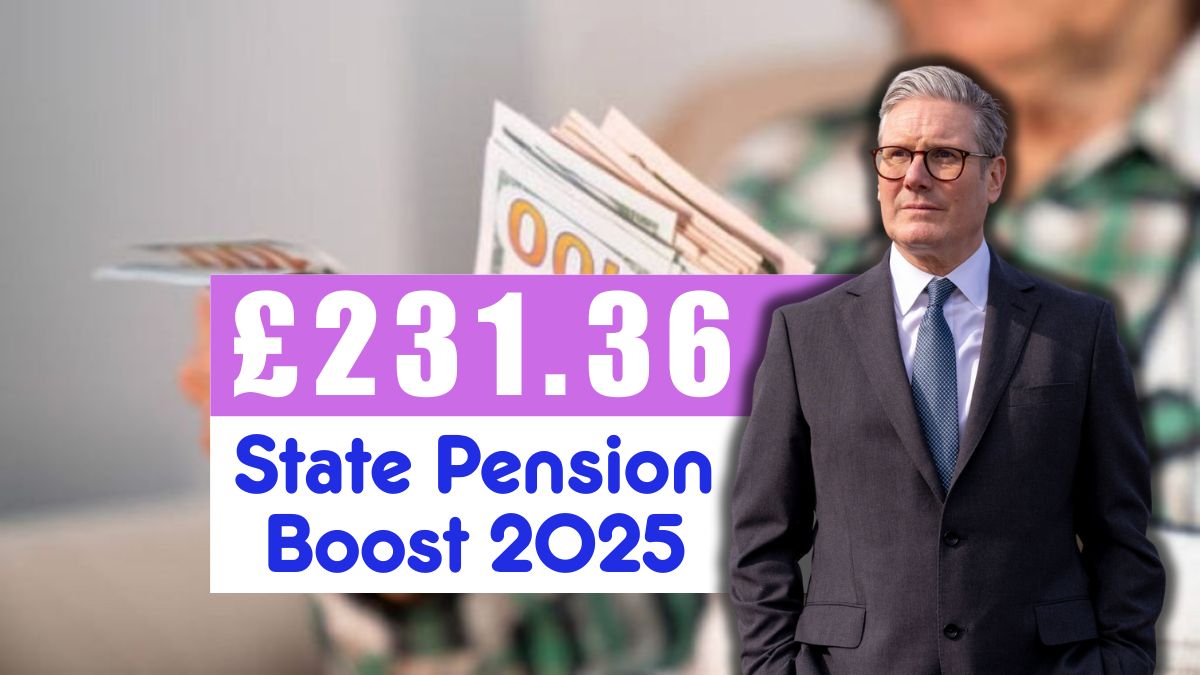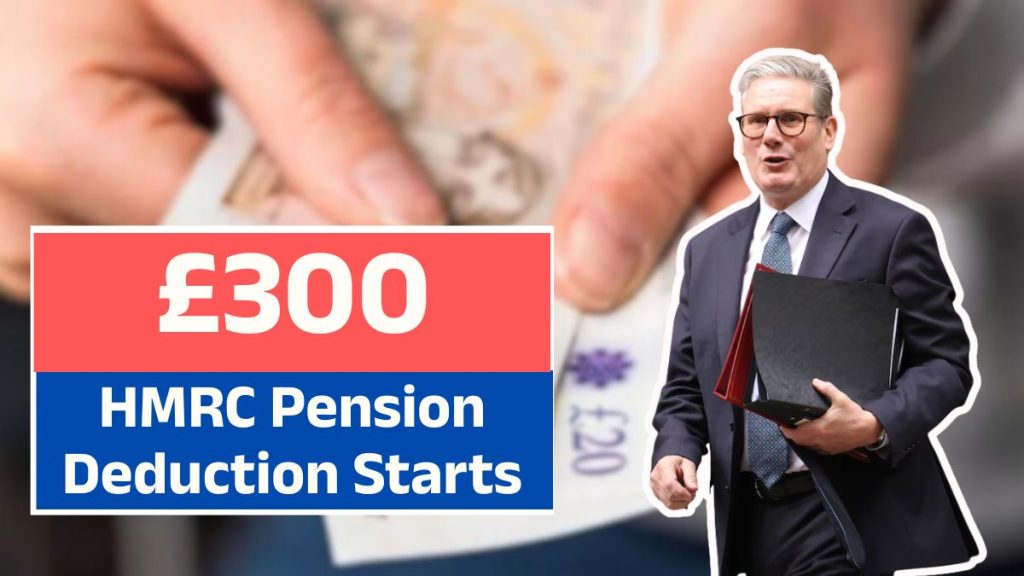The UK Government has confirmed a new rule from HM Revenue & Customs (HMRC) that will directly affect millions of pensioners. Starting 27 October, certain pensioners will notice a £300 deduction from their bank accounts — part of HMRC’s new system for correcting overpayments, tax discrepancies, and benefit reconciliations.
Officials have said this move is necessary to maintain fairness in the pension and tax systems, but it has triggered widespread concern among older citizens. Many fear it could reduce their regular income at a time when living costs remain high.
Here’s a full breakdown of what’s happening, who will be affected, and how pensioners can prepare for the changes.
Why HMRC Is Introducing the £300 Deduction
The new policy comes after an internal HMRC audit found that thousands of pension accounts had small tax underpayments or unclaimed overpayment corrections.
Rather than waiting until the next tax year, HMRC will now automatically adjust balances through a one-time deduction of up to £300 from eligible accounts.
According to a government spokesperson, this system “ensures that pension payments are aligned with correct tax codes and income thresholds” — preventing future errors and maintaining transparency.
In simple terms, this deduction allows HMRC to recover small overpayments directly, rather than carrying them forward for future adjustments.
Who Will Be Affected by the New HMRC Rule
HMRC has stressed that not all pensioners will face this deduction. The new measure applies only to specific cases where payment discrepancies have been identified.
The affected groups include:
- Pensioners flagged through the 2024–2025 tax reconciliation for overpayments.
- Individuals receiving State Pension or Pension Credit via a linked HMRC or DWP account.
- Pensioners whose tax bands recently changed due to private pensions, savings interest, or additional income.
- Cases where incorrect coding notices led to overpaid benefits or higher pension payments.
If you are affected, the deduction will appear on your bank statement as an entry such as “HMRC Adjustment” or “Pension Reconciliation.”
Most transactions will occur between 27 October and 15 November, with visible bank updates within 3–5 working days after processing.
How the Deduction Process Will Work
HMRC has emphasised that the deduction will not come without notice. Every affected pensioner should receive either:
- An official letter or email explaining the reason for the deduction, or
- A digital notice through their Government Gateway account.
The government has also stated that no deductions will occur without prior verification. Pensioners deemed financially vulnerable will be contacted beforehand to discuss repayment options.
The deductions will be carried out in phases, ensuring that no one faces sudden or unexpected financial pressure.
Why the Government Is Doing This Now
The timing of the deduction — right before the Autumn Statement — has drawn public attention. Officials argue that it is part of a larger fiscal tightening plan aimed at ensuring the sustainability of the pension system.
The Treasury has been under growing pressure to address a £1.3 billion backlog of pension overpayments, which built up during the pandemic.
By introducing a digital, automated correction system, HMRC hopes to:
- Recover small amounts fairly and efficiently.
- Avoid lengthy legal recovery processes.
- Prevent overpayment errors from affecting next year’s tax calculations.
However, many pensioners see this as a poorly timed decision during an ongoing cost-of-living crisis.
How to Check If You’ll Be Affected
If you’re unsure whether you’re among those affected, there are a few ways to verify your status:
- Log into your HMRC Personal Tax Account through the Government Gateway.
- Check for any recent messages or letters referring to “Tax Reconciliation” or “Pension Adjustment.”
- Review your latest pension or bank statement for any upcoming deductions labeled as “HMRC Adjustment.”
- Contact HMRC’s pension helpline for clarification if you have doubts.
By confirming early, you can prevent confusion or budgeting surprises once the deduction takes effect.
What to Do If You Can’t Afford the Deduction
HMRC has assured that pensioners facing hardship will not be left without options. Those unable to afford the deduction can request help through the following methods:
- Payment Deferral: Apply to postpone the deduction temporarily.
- Repayment Plan: Spread the £300 repayment over several smaller instalments.
- Hardship Support: Contact Citizens Advice or Age UK, which can guide you on how to appeal or seek assistance.
The key message from HMRC is clear — do not ignore official letters or emails. Failure to respond could result in automatic deductions being processed without your consent
Public Reaction to the Announcement
Reaction across the UK has been mixed. Many pensioners expressed frustration online, saying the timing of the new policy feels unfair given the economic challenges retirees already face.
One retired engineer from Bristol commented,
“I’ve worked and paid taxes for over 40 years. Now I’m being charged again for something I didn’t even know about.”
Others, however, agree with the government’s logic. Supporters argue that the move helps protect public funds and keeps the pension system sustainable for future generations.
Some financial experts also note that recovering small overpayments now could prevent larger, more disruptive adjustments in the future.
Expert Opinions on the £300 Deduction
Several well-known analysts have weighed in on the issue.
Martin Lewis, founder of MoneySavingExpert, urged pensioners to verify all communications before panicking:
“This isn’t random. It’s part of a structured repayment process. But always confirm that any message truly comes from HMRC before taking action.”
Economists from the Institute for Fiscal Studies (IFS) said the new system could “reduce administrative errors” but warned it may “increase stress among elderly citizens unfamiliar with online systems.”
Meanwhile, Age UK called for more transparency, urging HMRC to improve its outreach and ensure no pensioner faces unfair deductions due to administrative confusion.
The DWP’s Response
The Department for Work and Pensions (DWP) has backed the move, calling it a necessary alignment between tax and pension systems.
A DWP spokesperson said:
“Coordination between HMRC and DWP ensures pensioners receive the correct payments while preventing overpayment issues. Anyone concerned should contact us immediately for clarification.”
This coordination marks part of a long-term plan to create a unified digital pension and tax framework, improving efficiency and accuracy across government systems.
Long-Term Impact on Pensioners
The £300 deduction is not a one-off event—it signals a larger shift in how pensions and taxes are reconciled in the UK.
Experts believe HMRC’s future model will rely heavily on automated digital reconciliation, meaning real-time adjustments could replace annual manual corrections.
This approach may reduce future discrepancies but could also require pensioners to stay more engaged with online tools like the Government Gateway.
For those uncomfortable with digital systems, this could pose new challenges in understanding financial updates.
How to Prepare for Future Adjustments
To stay informed and avoid confusion, pensioners are advised to:
- Check your HMRC and DWP correspondence regularly.
- Update your contact and banking details on government platforms.
- Keep an emergency savings buffer to cover any small deductions or adjustments.
- Monitor income changes, especially if you receive private pensions, annuities, or interest from savings.
- Seek financial guidance if you receive multiple forms of retirement income that might affect your tax code.
Being proactive will help prevent unexpected deductions and make it easier to manage your finances confidently.
The Bigger Picture: Financial Accountability and Fairness
From the government’s perspective, the new deduction system is part of a broader fiscal responsibility initiative. The Treasury argues that recovering overpayments now will reduce future tax burdens and help balance public spending.
However, pensioner advocates believe the government should pair such policies with stronger support systems, ensuring older citizens are not disadvantaged by administrative reforms.
The £300 deduction might seem minor in economic terms, but for many retirees, it underscores the growing tension between efficiency in government finance and compassion for vulnerable citizens.
Final Advice for Pensioners
- Don’t panic if you see an “HMRC Adjustment” on your bank statement.
- Always verify correspondence through official government channels before responding.
- Contact HMRC early if you think the deduction may cause hardship.
- Seek guidance from trusted sources like Age UK or Citizens Advice.
- Stay alert for scams, as fraudsters often exploit such announcements to trick pensioners.
This new policy highlights the importance of vigilance and communication in managing your pension and tax obligations in a digital-first system.
FAQs on the HMRC £300 Pension Deduction
1. When will the £300 deduction take place?
The deductions will begin on 27 October 2025 and continue in phases until mid-November.
2. Will every pensioner lose £300?
No. Only those identified by HMRC as having overpayment discrepancies will be affected.
3. How will I know if I’m included?
You will receive an official letter or email from HMRC, or see the update in your Government Gateway account.
4. Can I delay or appeal the deduction?
Yes. Pensioners facing financial hardship can request a payment plan or appeal by contacting HMRC directly.
5. What should I do if I suspect a scam?
Never share personal or banking details via email or phone. Visit gov.uk/hmrc to verify any message before responding.























